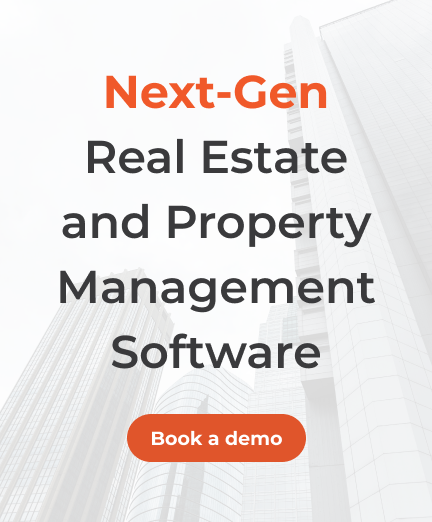Introduction
Qatar’s real estate industry is booming—and at the heart of this growth lies a powerful force: digital transformation. From smart city projects like Lusail to government-backed platforms like QREP, technology is reshaping how properties are managed, leased, and optimized. Property management software plays a central role in helping real estate businesses scale operations, cut costs, and align with Qatar’s ambitious Vision 2030.
As the country builds smart cities and big projects like Lusail City, these solutions help manage complex property portfolios more efficiently. These systems streamline operations aligning with Qatar’s vision of becoming a leading smart nation.
Overview of Qatar’s Real Estate Industry
According to recent data, Qatar's real estate sector is projected to grow from QR132.4 billion in 2023 to QR155.7 billion by 2028. PropTech innovations and smart city projects like Lusail City and Pearl-Qatar will play a significant role here. Over 70% of real estate companies in Qatar have adopted PropTech solutions, like AI-driven property management systems, IoT devices for smart buildings, and blockchain for secure transactions, into their operations. This adoption is particularly high in new developments like Lusail City, which is designed as a smart city with extensive use of digital technologies. Qatar has invested over $250 billion in infrastructure projects to enhance the efficiency and sustainability of real estate operations across the country.
Qatar National Vision 2030
Qatar's National Vision 2030 is a strategic roadmap designed to transform the nation into a diversified and sustainable economy. By 2030, Qatar aims to achieve sustainable growth, leveraging its rich natural resources while diversifying into non-hydrocarbon sectors to reduce dependence on oil and gas. The vision targets substantial growth in real estate, supported by policies that are favourable for investments and infrastructural advancements.
Why Digital Transformation is Crucial for property management?
Qatar's smart city market is set to grow rapidly, with a projected 12.5% annual increase between 2022 and 2027, reaching $4.6 billion by 2027. A 2023 report highlighted that companies embracing digital transformation could reduce operational costs by up to 20% while increasing customer satisfaction by 30%.
The integration of advanced technologies such as real estate property management software, artificial intelligence, blockchain, and data analytics is reshaping how real estate transactions are conducted, improving efficiency, and reducing costs.
The launch of digital platforms like the Qatar Real Estate Platform (QREP) has transformed property transactions. By offering centralized, real-time access to data, QREP has increased transparency and streamlined processes. In May 2024 alone, it managed over 322 real estate transactions worth QR1.26 billion.
Key Technologies Shaping Qatar’s property management
PropTech:
PropTech is leading the way in this transformation by bringing in digital innovations. Smart building technology is taking off, allowing real-time monitoring and control of energy use, which fits perfectly with Qatar's sustainability goals.
Blockchain:
Blockchain technology is changing property transactions by making them more transparent and less prone to fraud. The Sak Digital platform has sped up real estate deals, taking less than 30 minutes to process. The blockchain market in Qatar is expected to grow at a CAGR of 65%, reaching USD 253 million by 2026.
VR and AR:
Virtual and Augmented Reality are making property buying more exciting. They let you take virtual tours of properties, which is especially useful now after the pandemic. These technologies are updating Qatar’s real estate market and are necessary to keep up with the need for smart, eco-friendly city developments.
Cloud Computing:
Cloud computing is changing how real estate works in Qatar by making property management software easier to use and scale. It simplifies data access and security, helps make better decisions with advanced analytics, improves communication, and makes operations run more efficiently.
Internet of Things:
The IoT market in Qatar is expected to see significant growth over the next five years. This growth will be a result of the Tasmu Smart Qatar program as well as several infrastructure megaprojects, which plan to integrate IoT technologies.
Big Data Analytics:
Big data analysis is having a big impact on real estate in Qatar. It helps people in the industry look at a lot of data to find patterns and make better decisions. They can understand the market better and make more informed decisions for increasing their investments.
How PropTech is Revolutionizing Property Management
- A Knight Frank report says Qatar's real estate market is expected to grow by 5% each year. Technology and smart solutions are playing a bigger role in how property management is handled.
- More than 70% of real estate companies in Qatar are now using PropTech solutions in their operations.
- PropTech innovations, like property management software and IoT-enabled building systems, are automating operations and giving real-time data and predictions. This helps property managers cut operational costs by up to 15%.
- Automated systems like real estate property management software streamline processes like lease management and rent collection, cutting administrative time by 30%.
- The use of virtual and augmented reality for property viewings is increasing engagement from prospective tenants and buyers by 25%.
- AI chatbots and other digital tools make communication easier and give potential renters or buyers the information they need to decide if a property is a good fit.
Challenges and Opportunities in Adopting Digital Solutions
Challenges
Need for Updated Digital Regulation:
New technologies like AI are changing how people interact with businesses and disrupting old models. This means we need new digital rules to keep up with these changes and make sure they’re used the right way.
Lack of Skills to Operate Digital Platforms:
Qatar’s digital economy is growing fast, at 7.4% each year, and it’s expected to reach $25.4 billion by 2027. To keep up, we need to make sure people have the right skills to handle new digital tools. This means focusing on education and training so we can successfully carry out digital changes.
Cybersecurity Risks:
As real estate uses more digital tools and PropTech solutions, keeping data safe is becoming a bigger issue. To protect things like property deals and customer information, the industry is using new strategies like the Zero Trust security model to make sure that every access request is carefully checked.
Integration with Existing Systems:
A lot of real estate companies in Qatar still use old systems that don’t work well with new digital technologies. Mixing PropTech solutions with these outdated systems can be challenging and expensive, needing big investments in IT and training to make sure the new tools work smoothly.
Data Privacy and Protection:
With real estate moving more into the digital world, keeping data private is getting harder. Since these transactions include sensitive personal and financial details, it’s crucial to balance making data easy to access and clear, while also making sure it stays private using strict privacy laws.
High Cost of Implementation:
Using digital tools like AI and blockchain can be expensive. It's not just about the high upfront cost for the technology; there are also ongoing costs for keeping things running, updating systems, and training employees. For smaller real estate companies, these expenses can be a huge burden.
Opportunities
Alignment with Qatar National Vision 2030:
Digital transformation supports Qatar’s efforts to attract investments and be active in the global economy. By continually developing its ICT sector, Qatar shows its commitment to becoming a digital leader, which provides a solid base for innovation in real estate.
Cloud-First Policy Advantage:
Following the Cloud Policy Framework from the Communications Regulatory Authority (CRA), this policy sets up a great environment for using cloud technology in Qatar. It focuses on trust, security, and being clear about how things work, aiming to make Qatar a top digital center and support its goals to lead globally.
Strategic Investments by Tech Giants:
The launch of Google Cloud in Qatar and Microsoft’s new data centre plans show how important Qatar is in the global digital ecosystem. Google’s goal to improve Qatar’s economy by $18.9 billion over the next seven years highlights the big role digital infrastructure plays in economic growth.
Application of Advanced Technologies:
With Google Cloud launching in Qatar, businesses and startups can now take advantage of technologies like AI, blockchain, cloud computing, big data, and IoT across various fields, driving innovation in government, education, health, and economic growth.
Secure Data Management:
Qatar has concerns about data security and storing information abroad. Local data centers, like Google’s, are helping by offering safe and reliable places to store and process data
Multi-Cloud Environment:
With Google Cloud and Microsoft cloud services now in Qatar, businesses can use a multi-cloud approach, picking the best provider for their needs. The competition between these big players is expected to increase continuous improvements and innovations in digital solutions.
Steps to Implement Digital Transformation in property management
Conceive a Clear Strategy: Define a clear transformation strategy that aligns with your business goals. Look at the parts of your real estate operations where using automation can make things run smoother and add value.
Evaluation: Check how easily different tasks can be automated, and how smoothly the tool can be integrated with other systems and identify ways to improve processes so you can get the most out of automation.
Implementation: Put the transformation plan into action by setting up automated systems that make your daily tasks easier and more efficient.
Integration: Integrate it with existing systems to increase efficiency.
Training and Support: Provide thorough training for your team to help them use and manage the new automation tools effectively. Offer continuous support to assist the organization through the digital transformation process.
Prioritize Cybersecurity: Invest in strong cybersecurity measures to safeguard sensitive data and build trust with your clients.
Regular Updation: Keep a close eye on your automated processes to make sure they stay efficient by regularly updating the software.
The Role of Government in Driving Digital Adoption
Qatar National Vision 2030: Focus on developing smart cities and promoting sustainable urbanization through digital technologies to increase growth in the real estate sector.
Qatar Smart Nation Programme (TASMU): Aims to transform Qatar into a smart nation by investing USD 1.65 billion over five years. This initiative focuses on enhancing digital infrastructure in real estate and other key sectors.
Digital Agenda 2030: Aims at transitioning Qatar to a knowledge-based economy, with significant investments in digital infrastructure directly impacting real estate modernization and competitiveness.
E-Government Strategy: Encourages using digital platforms for things like property registration and transactions, which streamlines operations and increases transparency.
Digital Property Registration (Law No. 5 of 2024): Mandates digital property registration, enabling more efficient and secure real estate transactions in Qatar to improve transparency and reduce processing times.
Public-Private Partnership (PPP) Law No. 12 of 2020: Supports collaboration between the public and private sectors on real estate projects, encouraging the use of digital technologies to make operations run more smoothly and improve project management.
Freehold Property Ownership Law (Law No. 16 of 2018): Allows foreign investors to buy real estate in specific areas, which increases the demand for digital platforms to handle transactions.
Digital Transaction Systems: The introduction of platforms like the Sak System for real estate transactions has significantly reduced processing times.
Tourism and Real Estate Synergies: Encourages investment in beach resorts and other real estate projects using digital platforms within the PPP model, supporting Qatar's larger digital transformation goals.
How can Property Automate Help?
Property Automate is a reputable name in the PropTech area, offering advanced property management software for businesses of all sizes. Here’s how our solutions can drive digital transformation in Qatar
Digital Transformation of Business Operations
Property Automate is at the forefront of transforming real estate management in Qatar with advanced tools and technologies. Our platform integrates effortlessly with existing systems, providing a complete digital solution. This digital shift helps property managers simplify their work and use technology to make real estate management smarter and more efficient.
Process Automation for Increased Productivity
Our productivity tools make things simpler for property managers and tenants, so they can focus on what matters. With automated alerts, organized documents, and easy communication, businesses get instant updates and manage services better, boosting productivity and creativity.
Mobile Apps and Device-Driven Capabilities
Our property management apps let property managers and owners handle everything from their phones or tablets, no matter where they are. This makes managing properties easier and more efficient.
Streamlined Communication and Tenant Experience
Our digital solutions improve communication, making it easier and faster for service providers and tenants to interact. This helps manage maintenance requests better and increases tenant satisfaction and operational efficiency, making the real estate environment in Qatar more connected and adaptable.
Reduced IT and Maintenance Costs
Our versatile products add great value by easily integrating with third-party devices, saving on IT costs, and providing a smooth user experience. With our legacy system integrations and all-in-one property management solutions, customers in Qatar can simplify their operations and reduce vendor and maintenance costs.
Real-Time Information Access
Property Automate gives you quick access to property details, tenant details, and business updates, so you always have the latest data for fast and smart decisions. Our technology connects with government systems to make everything more transparent and help manage real estate better.
Business Scalability and Investment Flexibility
Property Automate offers flexible and customizable tools that work well for both small businesses and big property portfolios. Our platform is easy to adapt to and connect with other systems, giving you dependable performance and features that fit your needs. It helps property managers in Qatar handle and expand their investments more easily.
Data Security and Compliance
At Property Automate, we prioritize data security and compliance. By using Oracle Cloud Infrastructure (OCI), we keep your data safe and offer reliable, compliant property management solutions.
Workflow Management and Business Execution
Our solutions support digital transformation with ready-to-use workflows and templates that simplify decision-making and increase productivity. By minimizing the need for customization, you save time and money, speeding up adoption and improving efficiency in line with industry trends.
Business Intelligence and Performance Analytics
Property Automate drives digital transformation with advanced analytics and business intelligence tools. Our platform delivers valuable insights and reports to boost decision-making, efficiency, and growth, giving property managers powerful resources for success.
Transform your property management with Property Automate’s advanced property management solutions. Connect with us today for a free demo and 14-day trial to explore how our technology can enhance your operations and support your growth. Let's build a successful partnership together.
Conclusion
Qatar’s real estate industry is entering a decisive chapter where technology, transparency, and efficiency are shaping every aspect of property management software. From government-led smart city initiatives to the adoption of advanced property management software, this transformation is changing how leases are handled, maintenance is managed, and data is shared across the sector. For property owners, managers, and investors, embracing these digital tools means faster responses, smarter decision-making, and service levels that meet the expectations of today’s tech-savvy residents. As the nation moves forward with its Vision 2030 goals, those who invest in innovation now will secure a lasting advantage, positioning themselves as leaders in a market that rewards efficiency, trust, and adaptability. Choosing the right property management software in Qatar has become more than just an operational upgrade—it’s a strategic move toward long-term success.
FAQ's
1. What technologies are shaping Qatar real estate property management software today?
Technologies like PropTech, AI, blockchain, IoT, cloud computing, and VR/AR are driving innovation in Qatar real estate property management software, enabling automation, smart analytics, secure transactions, and immersive virtual property tours.
2. How does property management software in Qatar benefit real estate companies?
Property management software in Qatar streamlines lease tracking, rent collection, maintenance requests, and tenant communication. By centralizing these functions, real estate companies can efficiently manage complex portfolios and deliver higher-quality services.
3. Is Property Automate compatible with Qatar’s smart city initiatives and property management needs?
Yes. Property Automate is fully compatible with Qatar real estate property management software ecosystems, integrating with local smart city infrastructure, complying with regulations, and supporting multi-property scalability.
4. How does Property Automate ensure data security in Qatar real estate property management software?
Property Automate uses Oracle Cloud Infrastructure (OCI) and strict compliance protocols to secure all data within Qatar real estate property management software systems, protecting sensitive tenant and property information in line with national security standards.





